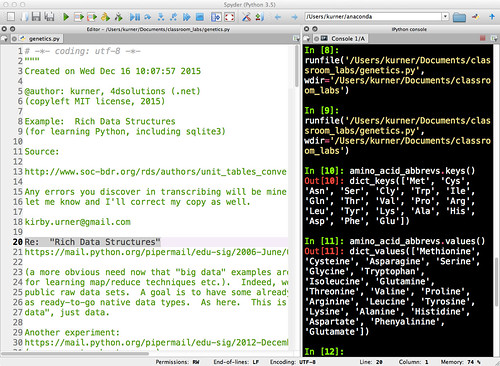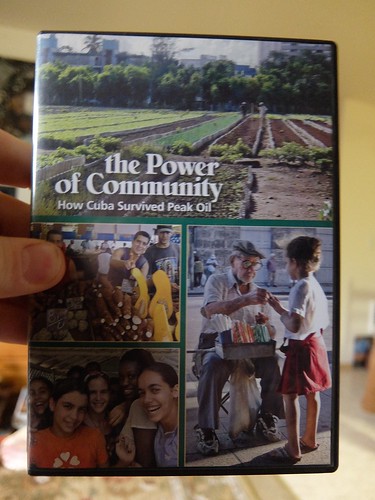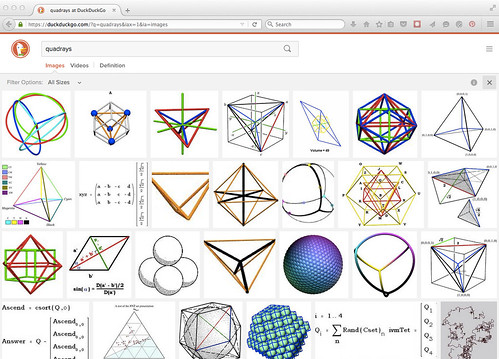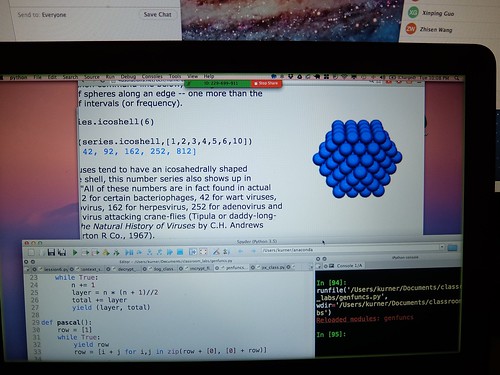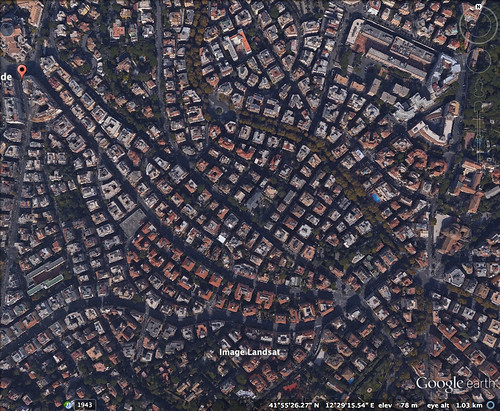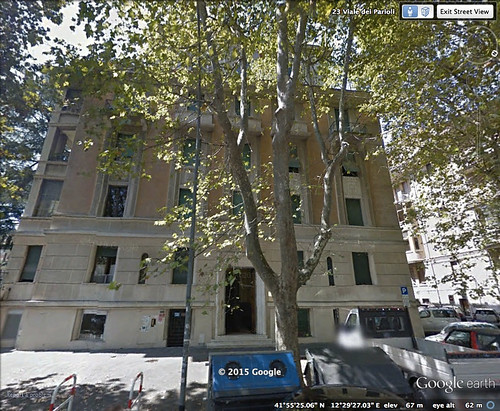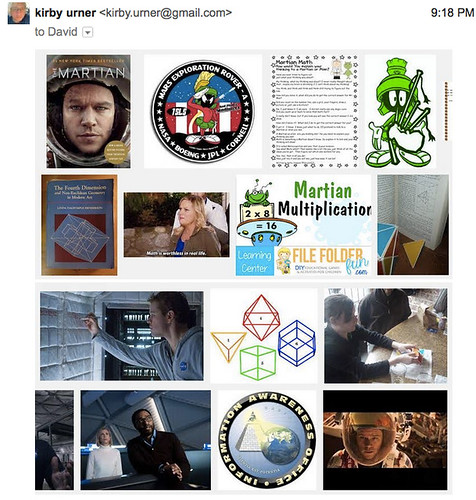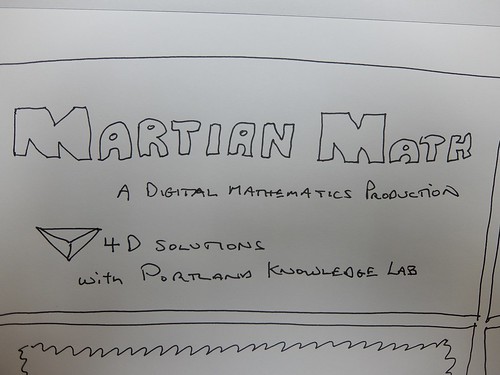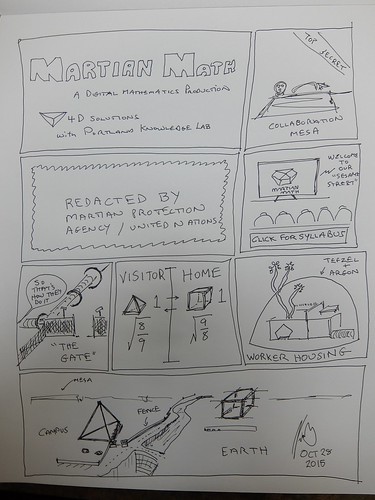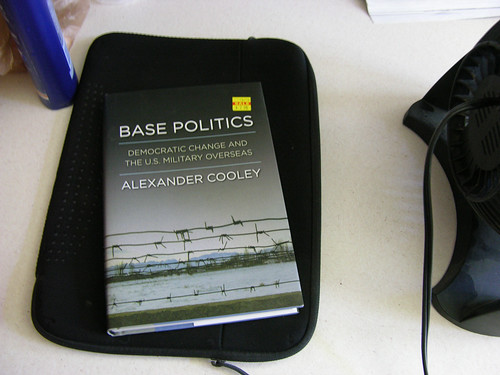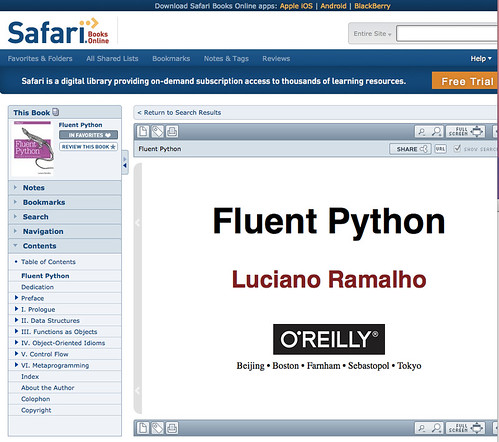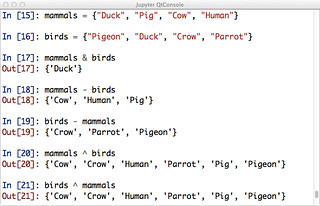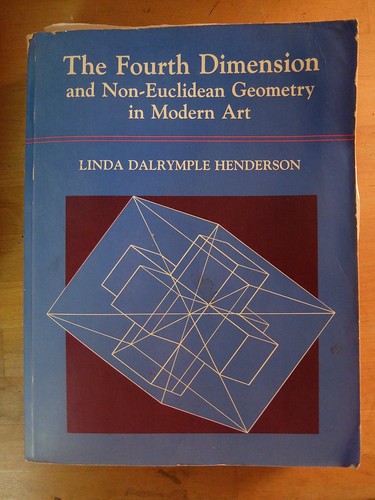[
a first draft published to MathFuture, a Google Group ]
My talks at PyCons
(Python conventions) and OSCONs (Open Source conventions) going back
show me mounting the stage to decry "calculus mountain", by which I
meant the obstacle course and sometimes source of disappointment occasioned by the "forced march" through "delta calculus" if
wanting to get into a four year college, and by extension into a STEM
field (or "work for NASA" as some put it).
My contention, in those years, was those like me who'd made it over calculus mountain
-- I got into honors calc at Princeton, skipping the regular, had
Thurston the topologist for a prof; we used Spivak's,
Calculus on
Manifolds -- found on the other side some "cool pools" i.e. an oasis of
other mathy topics that
could have been just as well taught in high
school, providing alternatives to those not turned on by calculus.
An example of such a "cool pool", no delta calc required, is Group
Theory. Permutations at play. More generally, what we today call
"discrete mathematics" was screamingly relevant, in terms of the doors
it opens, compared with "integration by parts", or so I believed. I
found other voices sang with mine. I was part of a choir. I also
joined forces with those wanting to teach "how to code" (computer
program) for core credit.
Fast forward and I'm in Oregon,
joining a small lobby group to say to the legislature: "You know those
three years of math you require for a high school diploma? We want to
bring in discrete math topics and open up more space in STEM than just
pre-calculus / calculus, whaddya say?" As far as I can tell, pretty
much all the states said "
OK" in unison i.e. they had no concrete
objections to math-credit computer science. So ruled without objection,
right?
When it comes to marketing the possibility in
practice however, that's another matter and big publishing gets
involved. I like to float mnemonics, easy to use -- but we hope not
misleading -- memes. Calling the conventional pre-calc / calc track
"delta calculus", as I do above, is not how most people write. The
letter "delta", though used in differential / integral calculus, has not
been made to "brand" it in that way. High school calculus, as
typically taught, does not go by any Greek letter.
My innovation, then, was to cast "delta calc" versus "lambda calc" as two flavors of
"calc" (computation), like chocolate and vanilla. No one said a given
student can't do "swirl" (both flavors mixed together).
Lets
be clear: lambda calc already exists, one might point to the Princeton
Institute for Advanced Study, a couple generations back: Alonso Church
and company. So where do we want to take it next?
Lets remember
that so-called "delta calculus" was at one time esoteric and not
introduced pre-college. In formalizing the work of Newton and Leibniz,
as filtered through generations of refinement, thank the French, we got
it into the form of pre-college deliverables, a spiral, a ladder,
featuring Riemann sums and Leibniz notation for derivatives, first,
second, third and so on. Different school systems have different
histories. Many narratives criss-cross (inter-weave).
In
canning calculus ("canning" as in "canning tuna" not as in "firing from a
job") for the pre-college crowd, we sliced out most of the history. We
take for granted that mathematics, being a "universal language" is
somehow too eternal to be subjected to a merely tempo-real -- as in
historical -- treatment. That's considered aftermarket trade book
reading. Textbooks must peek at history only in sidebar, or in footnotes
maybe.
Whatever the rationale for so sanitizing the subject, we
neglect a most important bridge to the humanities i.e. here is where
C.P. Snow's chasm, betwixt the humanities and sciences begins to yawn.
History provides at least a rope bridge across, whereas many find
themselves trapped, on one side or the other (reading maths or reading
history, but never the twain together thanks to illiteracy barriers).
Were
we to restore more of the history, we would discover more of the all
too human drama of contention. But is debate a bad thing? Isn't moving
forward a matter of dialog, or "dialectic" as the educated say?
Mathematics
has not evolved quietly, without argument. Newton and Leibniz argued
with each other (a priority dispute) while Bishop Berkeley attacked the
whole idea of infinitesimal quantities and proofs based on them (a
conceptual integrity dispute). Cantor and Kronecker took different
sides in some arguments. There's ferment, disagreement, or at least
alternative ways to go.
But that's precisely what gets white washed in going over this material: schools find it expedient to agree
there's at least one subject on which everyone agrees. Or, if they
don't, at least none of the boiling-over arguments should touch the kids. That math is contentious gets "dirty secret" or "in the closet" treatment.
But Thomas Kuhn in his talk of "paradigms" at least made it OK / safe to
question the caricature of a "steady advance" did he not? So why be so
timid? Why all the shielding?
Anyway, in rolling up "lambda
calculus" into a more popular form, like was done already with the
Newton - Leibniz stuff, I've focused on "composition of functions" as
the primitive notion, with the multiplication operator very soon
introduced as a "composer operator", so that we further develop that
sense of polymorphism around operators, the ground of Abstract Algebra.
A permutation, a mapping of objects to themselves in another or same
order, is a primitive function, a set of ordered pairs. It's
one-to-one, bijective. And permutations may be "chained" (composed).
As a topic, they thicken the soup of whatever computer language, giving a
gym to work out in.
"Why use the multiplication operator at
all?" That's where the "cool pool" of Group Theory comes in. This is
material we currently try to get into around Algebra 1 and 2, just a
little, but we're in a hurry to dive into delta calc.
We have no time
for passing functions as arguments to other functions, as we do in
Python and other languages (that's a good introduction to delta calc
too, through the gate of functions with function-arguments).
But now we
do have that time, because we have a fork in the road and the freedom
to follow the lambda calc road instead, or in addition, to the delta
calc road. The lambda calc road is certified legal and open to traffic,
we just need more teachers to help out as guides.
I'm
under no illusions that with the snap of some fingers, even more than
just mine, these "reforms" might be injected in short order. Rather I'm
providing a road map for like-minded to reference, when explaining to
the general public or intelligent layman what the strategy is. "All the
computer stuff we don't currently manage to squeeze in? -- we've got a
way now, and I can explain it in terms of two Greek letters, lambda and
delta".
I've "rehabilitated" obscure disciplines before,
too early to assess with what success. General Systems Theory (GST) is
all over the place (somewhat like Tensegrity), as a management
philosophy, as a kind of ecology, who knows? It has a high caliber
pedigree but where does it go from here?
I noticed how
Economists and Economics tend to have monopoly status when it comes to
advising the financial markets regarding guns vs. butter, and suggested
GST muscle in under the banner that "monopoly breeds inefficiency" owing
to lack of serious competition. GST was about giving Economics a run
for its money. Still is. That's easy to understand, no?
Courses in
GST could just as well provide rungs of that "climbing some business
world ladder" as more science-oriented than Econ in some dimensions,
including around issues of climate change we might hope.
Finally, another axis or spectrum I've contemplated, as have many, is what oft
goes by "left brain" versus "right brain" as a dichotomy. My track
record is riddled with slides talking about "lexical versus graphical"
by which I somewhat mean the same thing as the brain hemisphere people
do. We're talking about bridges again.
In STEM a goal is to have
noodling-with-symbols (call it "algebra" or "being lexical") match up
with visualizations and other experiential presentations or summaries.
We want to understand what we're looking at when interpreting all that
data.
Control panels, dashboards, instruments, sensors... we
have a kind of model, view, controller architecture to consider, where
what we reason about and codify using semi-numerical algorithms is the
model, the business logic, and what we view and measure is feedback
regarding our direction, as a company or enterprise or whatever.
We
hope for some kind of decision-making or steering capacity, where
choosing a more promising direction, over a less promising one, remains a
possibility. We're hoping to be more like pilots, not just witnesses
to the inevitable, spectator-fatalists with no active role. "Activism"
is not a negative, but informed and effective activism is better yet.
"Passivism" is not an English word, but needs to be, as many are
militantly passivist in their anti-activism. I think "reactionary" is
getting tired and needs a rest.
One of the best
left-right i.e. lexical-graphical connectors I've found is using string
substitution in lexical computer code to build a script that, when
rendered, provides a ray tracing and / or perhaps a 3D printable
object. VRML and POV-Ray scene description language were often my two
top choices, with similar choices in Elastic Interval Geometry land (a
branch I was following).
The 2D fractal, the Mandelbrot Set in
particular, coupled with some historical timeline information, is a
perfect topic, a sweet spot. A strong lambda calculus course could set
its sights in that direction: doing the vector math lexically, with
overloaded operators (like + and *), yet driving graphics on the
screen. Gerald de Jong's "creatures" provide a great example, of "math
puppets" turning logic into animations.
Another
approach to bridging model-lexical with viewable-graphical is to simply
build up the skills to create a dynamic web page, where things happening
graphically are driven by things happening lexically in the code. In
my Digital Mathematics outline, I cover that in "
Supermarket Math" which
would cover "e-commerce" (but regular commerce as well, as brick and
mortar stores use SQL just as much). Mine is but one more sandcastle on
this pretty big beach -- just take a few ideas, flatter me by copying.
The goal is to forge these left-right connections, even as we bridge the C.P. Snow chasm by remembering to share more history.

